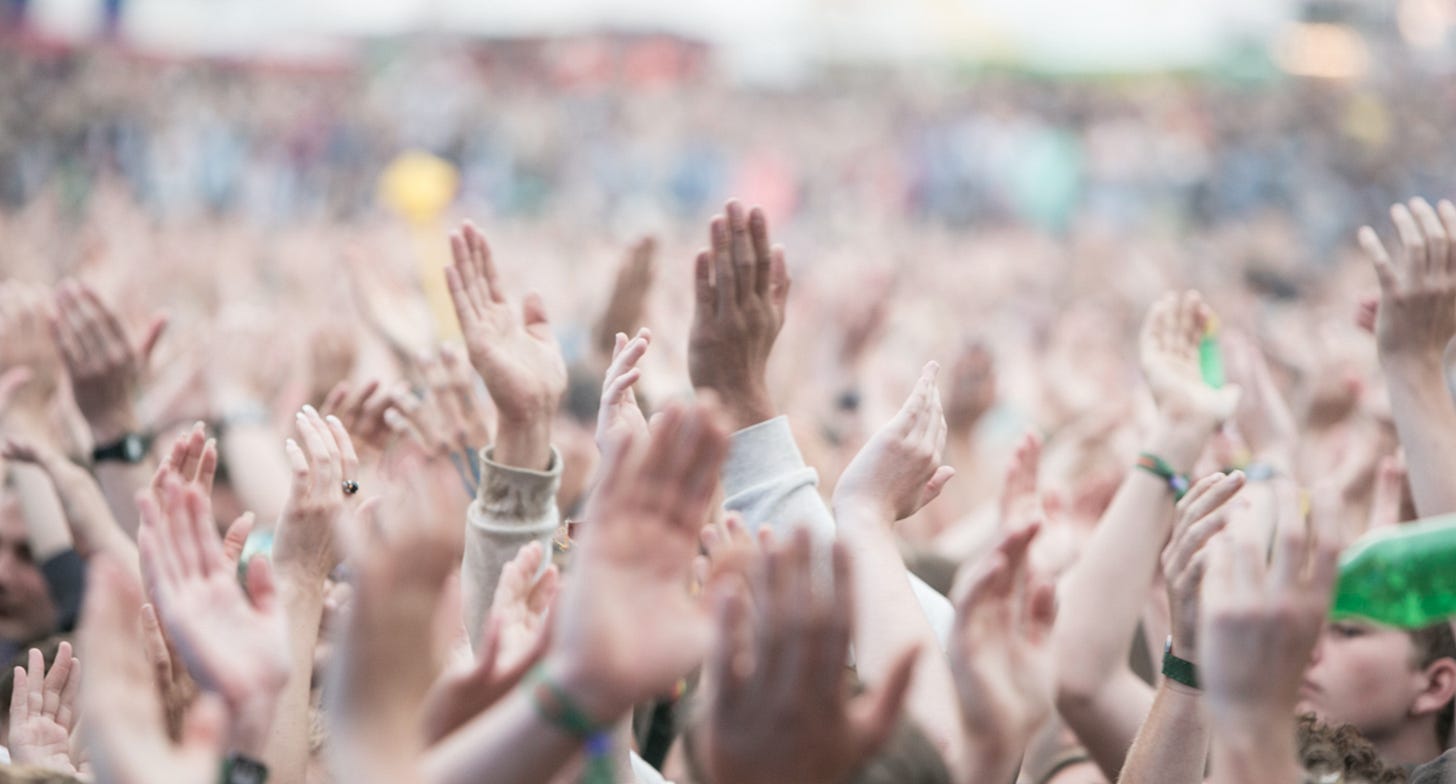Am I Wrong About the Live Music Resurgence?
Am I crazy? Let's find out...
Yesterday I shared nine happy predictions about the future of music.
Many of you joined with me in the positive vibes. We were happy together—feeling groovy again.
It was such a fine and natural sight.
But some spoilsports want to burst our bubble—because I announced the resurgence of live music.
“What is Ted smoking?” they asked. Everything happens online nowadays—why should music be any different?
If you want to support my work, consider taking out a premium subscription (just $6 per month).
“The idea flies in the face of the trending changes” points out one reader. “If live shopping, eating out, movies, etc are all going online, why would music trend in the opposite direction?”
So is my claim—that live music will be the source of energy, excitement, and profits—just a dream?

Not in the least. Let’s do the math—I think I can prove it to you.
My streaming plan is a family package which costs less than eighteen cents per day per person in my family.
If I go to a live concert, I can easily pay $200 or more. (The average expenditure for a fan attending Taylor Swift’s Eras concert tour was a thousand dollars—so this is a very reasonable assumption.)
In other words, live music generates more revenues than streaming even if I only attend one concert every two years.
This is where the comparison with other forms of online shopping just fall apart. Most products cost roughly the same if you get them online versus in-person—but in music the amount spent on real world consumption is hundreds of times more than a digital transaction.
“One fan who goes to a concert is more profitable than ten thousand fans who stream.”
And the difference in profitability is even more extreme—because profit margins in streaming are tiny, while ticket sales for live events are very profitable.
For many years, streaming generated no profits whatsoever. Spotify didn’t make money until this year—after raising subscription prices.
Let’s compare this with the profitability of live music. Here is a recent analysis of the largest concert promoter in the world, Live Nation:
For the ticketing service itself, the AOI [adjusted operating income] margin in 2023 was 37%, or about $1.1 billion off of $3 billion in revenue. For Live Nation’s sponsorship business, which means selling concert and festival advertisements, it was 61%, or about $600 million off of $1 billion of revenue. Margins at these levels are high, reflective of market power.
I’m not praising Live Nation—which is abusive in its pricing techniques. But that’s only possible because fans are willing to pay so much for live music.
The bottom line is clear and unarguable: Even if just a tiny number of fans embrace live music, it will generate far more cash profits than streaming.
The head of Sony Music Group admitted this last week in his interview. He won’t share all the numbers, but said that live music was a “gold mine” and “frankly, more lucrative than streaming.”
And I haven’t even included other advantages of live music as a profit generator for musicians.
A greater share of profits go to musicians for ticket sales, compared with streaming
Musicians also get money by selling merchandise at the concert—this often generates more cash than the ticket itself.
And we also need to calculate the second-order effect of fans streaming the artists’ songs more because they saw them live.
If you add this up, you see that one fan who goes to a concert is more profitable than ten thousand fans who stream.
RELATED ARTICLES
Are Pandemics Followed by Eras of Festivities?
Nine Predictions for the Future of the Music Business
Of course, none of this was true a few years ago. During the pandemic, live music collapsed. Nobody went to concerts.
During that period, everybody in the music industry started chasing clicks and apps. And they’re still doing it—but they are missing the larger picture.
Yes, live music is coming back. But it doesn’t need to replace streaming. Even at the current growth rates, it will dominate music business economics.
“You can’t build a music career on zombie listeners glued to their screens.”
And when you add to this the obvious energy and excitment that comes from a live event, the conclusion is obvious.
Music is different from movies or gaming or other entertainment categories. For a musician, digital is not the answer.
In many cases, it’s just a distraction. Musicians should forget about chasing clicks—what they really need is loyal flesh-and-blood fans.
Those swipe-and-scroll zombies at home can’t change this. They are irrelevant. They don’t spend enough on music to matter. Chasing after them is a waste of time.
You can’t build a music career on zombie listeners glued to their screens.
So the future of music really will come from a direct encounter between musician and fans. Silicon Valley will not be able to change that, no matter how many bots and devices and bogus AI tracks it dumps on the market.




I am a musician and bandleader for a community choir, secular, not auditioned, inclusive, all ages. Our concerts are growing and growing, we're getting more and more requests to perform live in all kinds of places and at Civic events. I think part of the reason that live music is going to survive and thrive is that sense of community coming together that we desperately need as humans. We are not just a bunch of individuals; we were collective groups sharing resources, sharing thoughts, synced to each other through our nervous systems and our brain waves. Singing together with people in a choir is an unbelievably powerful and healing experience, but sitting in an audience and allowing that to wash over you is absolutely incredible. So is any live music that is emotional and honest and powerful and original and true. Thank you, Ted, for giving me some hope again when gigs for solo musicians are few and far between. I'm so grateful I do what I do, and I'm so grateful that I stumbled across this interesting and happy little place on the web.
Here in Canada a big problem is the dwindling number of small and medium-sized venues. Live Nation controlling so many venues doesn’t help either. Even academics are noticing:
https://hive.utsc.utoronto.ca/public/sociology/Reimagining%20Music%20Venues_Final%20Report.pdf
New bands and musicians who don’t seek superstar status have a hard time finding a place to play.